Serving 400 students in grades Prekindergarten-8, Hazel Park Preparatory Academy ranks in the bottom 50% of all schools in Minnesota for overall test scores (math proficiency is bottom 50%, and reading proficiency is bottom 50%).
The percentage of students achieving proficiency in math is 10% (which is lower than the Minnesota state average of 45%). The percentage of students achieving proficiency in reading/language arts is 18% (which is lower than the Minnesota state average of 51%).
The student:teacher ratio of 12:1 is lower than the Minnesota state level of 13:1.
Minority enrollment is 94% of the student body (majority Asian and Black), which is higher than the Minnesota state average of 39% (majority Black and Hispanic).
Quick Stats (2025)
- Grades: Prekindergarten-8
- Enrollment: 400 students
- Student:Teacher Ratio: 12:1
- Minority Enrollment: 94%
- Overall Testing Rank: Bottom 50% in MN
- Math Proficiency: 10% (Btm 50%)
- Reading Proficiency: 18% (Btm 50%)
- Science Proficiency: 6-9% (Btm 50%)
- Source: National Center for Education Statistics (NCES), MN Dept. of Education
Top Rankings
Hazel Park Preparatory Academy ranks among the top 20% of public schools in Minnesota for:
Category
Attribute
Diversity
Percent Eligible For Free Lunch
School Overview
Hazel Park Preparatory Academy's student population of 400 students has declined by 31% over five school years.
The teacher population of 33 teachers has declined by 15% over five school years.
Grades Offered
Grades Prekindergarten-8
Total Students
400 students
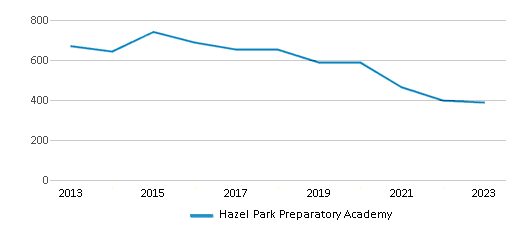
Gender %
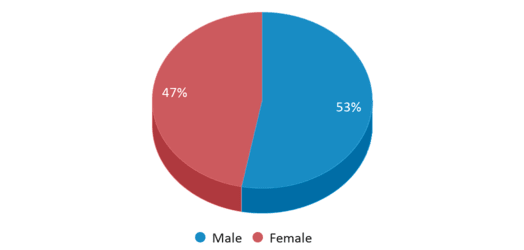
Total Classroom Teachers
33 teachers
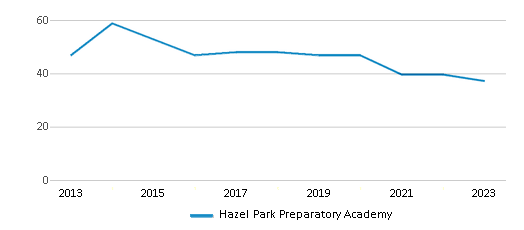
Students by Grade
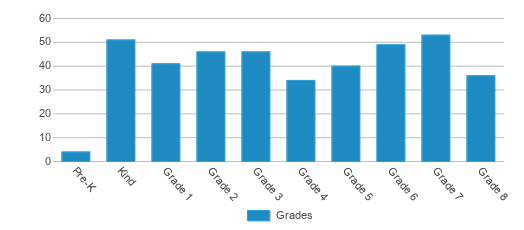
School Rankings
Hazel Park Preparatory Academy ranks within the bottom 50% of all 1,860 schools in Minnesota (based off of combined math and reading proficiency testing data).
The diversity score of Hazel Park Preparatory Academy is 0.70, which is more than the diversity score at state average of 0.59. The school's diversity has stayed relatively flat over five school years.
Overall Testing Rank
#1800 out of 1860 schools
(Bottom 50%)
(Bottom 50%)
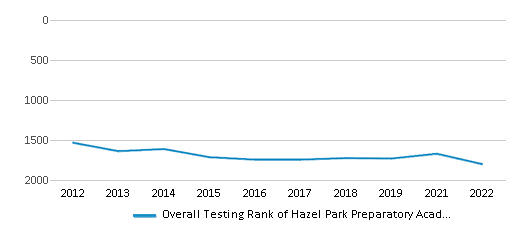
Math Test Scores (% Proficient)
10%
45%
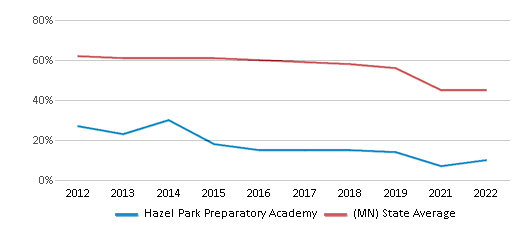
Reading/Language Arts Test Scores (% Proficient)
18%
51%
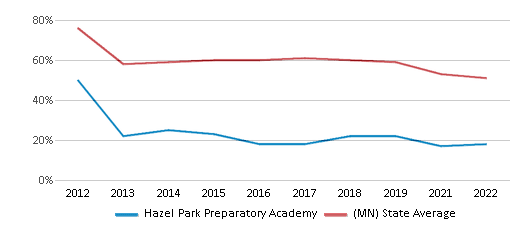
Science Test Scores (% Proficient)
6-9%
41%
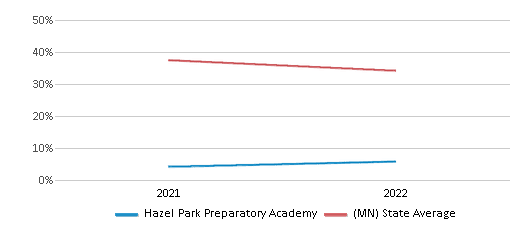
Student : Teacher Ratio
12:1
13:1
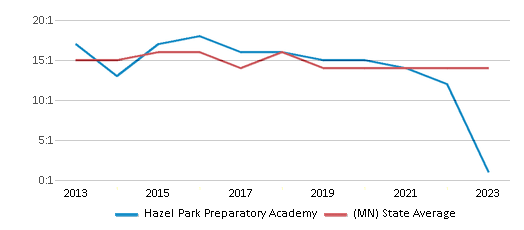
American Indian
n/a
2%
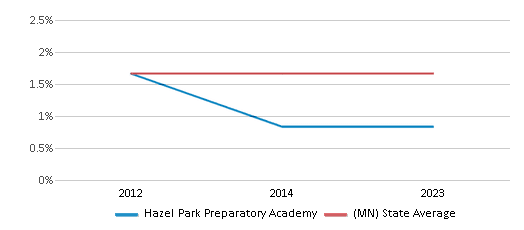
Asian
40%
7%
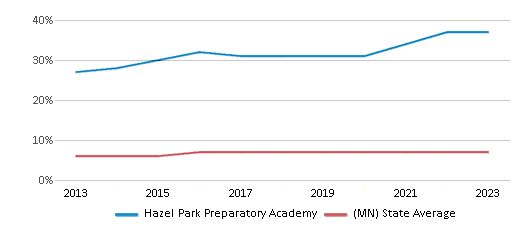
Hispanic
12%
12%
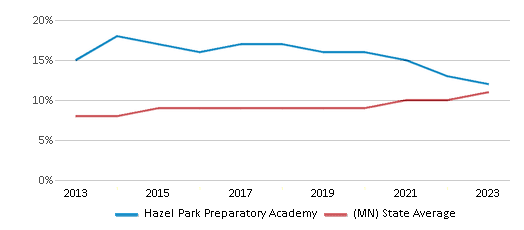
Black
35%
12%
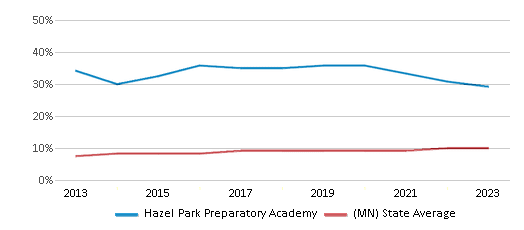
White
6%
61%
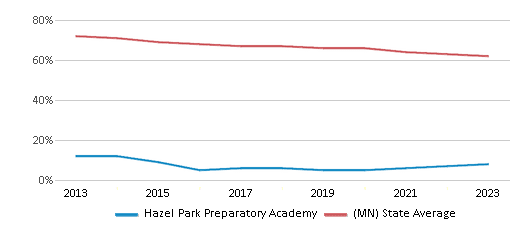
Hawaiian
n/a
n/a
Two or more races
7%
6%
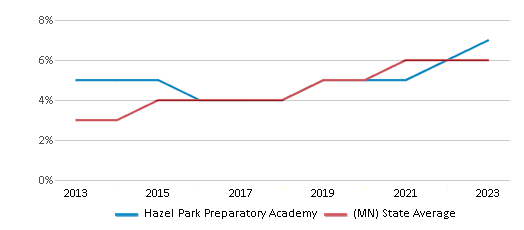
All Ethnic Groups
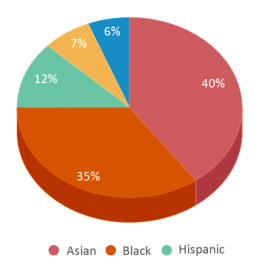
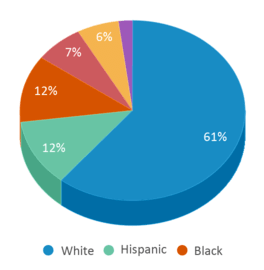
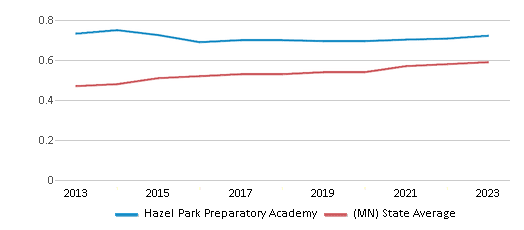
Participates in the National School Lunch Program (NSLP)
Yes
Eligible for Free Lunch
82%
36%
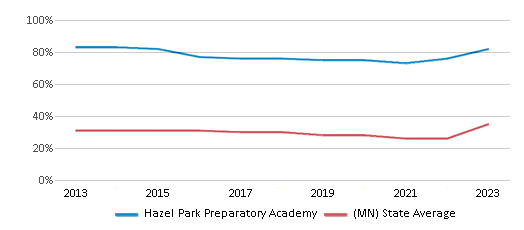
Eligible for Reduced Lunch
9%
7%
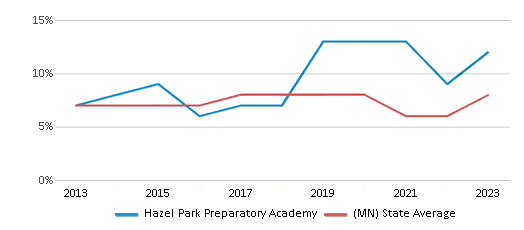
School Statewide Testing
School District Name
Source: National Center for Education Statistics (NCES), MN Dept. of Education
Profile last updated: 02/09/2025
Frequently Asked Questions
What is Hazel Park Preparatory Academy's ranking?
Hazel Park Preparatory Academy is ranked #1800 out of 1,860 schools, which ranks it among the bottom 50% of public schools in Minnesota.
What percent of students have achieved state testing proficiency in math and reading?
10% of students have achieved math proficiency (compared to the 45% MN state average), while 18% of students have achieved reading proficiency (compared to the 51% MN state average).
How many students attend Hazel Park Preparatory Academy?
400 students attend Hazel Park Preparatory Academy.
What is the racial composition of the student body?
40% of Hazel Park Preparatory Academy students are Asian, 35% of students are Black, 12% of students are Hispanic, 7% of students are Two or more races, and 6% of students are White.
What is the student:teacher ratio of Hazel Park Preparatory Academy?
Hazel Park Preparatory Academy has a student ration of 12:1, which is lower than the Minnesota state average of 13:1.
What grades does Hazel Park Preparatory Academy offer ?
Hazel Park Preparatory Academy offers enrollment in grades Prekindergarten-8
What school district is Hazel Park Preparatory Academy part of?
Hazel Park Preparatory Academy is part of Saint Paul School District.
In what neighborhood is Hazel Park Preparatory Academy located?
Hazel Park Preparatory Academy is located in the Greater East Side neighborhood of Saint Paul, MN. There are 14 other public schools located in Greater East Side.
School Reviews
2 3/24/2021
Haha hahaha the school and teachers aren't that professional in person. Haha, a lot of the teachers are nice, but they need to be a little more strict on the students. In every class there's always gotta be a student doing something stupid or mad and the teachers don't even do anything about it. Hppa gives a lot of freedom, and I'm sure the students appreciate that but the teachers still need to know how to control them. Some teachers do well at teaching new things, and others don't. I only recommend going to this school if you live near it.
5 10/10/2014
this school is great.Some of the staff though shows more attention to the Asian children to the other races
Review Hazel Park Preparatory Academy. Reviews should be a few sentences in length. Please include any comments on:
- Quality of academic programs, teachers, and facilities
- Availability of music, art, sports and other extracurricular activities
Recent Articles

What Is A Charter School?
Explore the world of charter schools in this comprehensive guide. Learn about their history, how they operate, and the pros and cons of this educational innovation. Discover key facts about charter schools, including admission policies, demographics, and funding, as well as what to look for when considering a charter school for your child.

10 Reasons Why High School Sports Benefit Students
Discover the 10 compelling reasons why high school sports are beneficial for students. This comprehensive article explores how athletics enhance academic performance, foster personal growth, and develop crucial life skills. From improved fitness and time management to leadership development and community representation, learn why participating in high school sports can be a game-changer for students' overall success and well-being.

February 05, 2025
Understanding the U.S. Department of Education: Structure, Impact, and EvolutionWe explore how the Department of Education shapes American education, from its cabinet-level leadership to its impact on millions of students, written for general audiences seeking clarity on this vital institution.








